Related Research Articles
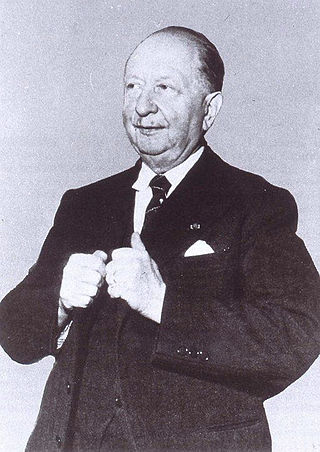
The Annales school is a group of historians associated with a style of historiography developed by French historians in the 20th century to stress long-term social history. It is named after its scholarly journal Annales. Histoire, Sciences Sociales, which remains the main source of scholarship, along with many books and monographs. The school has been influential in setting the agenda for historiography in France and numerous other countries, especially regarding the use of social scientific methods by historians, emphasizing social and economic rather than political or diplomatic themes.

1570 (MDLXX) was a common year starting on Sunday in the Julian calendar.

Adrien-Marie Legendre was a French mathematician who made numerous contributions to mathematics. Well-known and important concepts such as the Legendre polynomials and Legendre transformation are named after him. He is also known for his contributions to the method of least squares, and was the first to officially publish on it, though Carl Friedrich Gauss had discovered it before him.

Jacques Pierre Brissot, also known as Brissot de Warville was a French journalist, abolitionist, and revolutionary leading the faction of Girondins at the National Convention in Paris. The Girondins favored exporting the revolution and opposed a concentration of power in Paris. He collaborated on the Mercure de France and the Courier de l'Europe, which sympathized with the insurgents in the American colonies.
This article presents lists of literary events and publications in the 16th century.
Events from the year 1558 in literature.
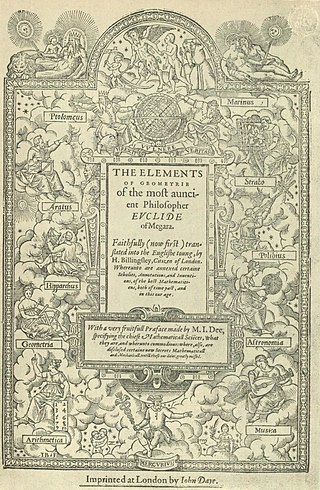
The Elements is a mathematical treatise consisting of 13 books attributed to the ancient Greek mathematician Euclid c. 300 BC. It is a collection of definitions, postulates, propositions, and mathematical proofs of the propositions. The books cover plane and solid Euclidean geometry, elementary number theory, and incommensurable lines. Elements is the oldest extant large-scale deductive treatment of mathematics. It has proven instrumental in the development of logic and modern science, and its logical rigor was not surpassed until the 19th century.
Les Éditions de Minuit is a French publishing house. It was founded in 1941, during the French Resistance of World War II, and is still publishing books today.

Jacques Cassini was a French astronomer, son of the famous Italian astronomer Giovanni Domenico Cassini. He was known as Cassini II.
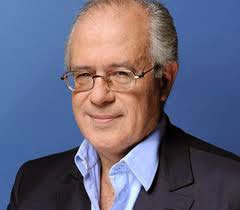
Jacques-Alain Miller is a psychoanalyst and writer. He is one of the founding members of the École de la Cause freudienne and the World Association of Psychoanalysis which he presided from 1992 to 2002. He is the sole editor of the books of The Seminars of Jacques Lacan.

Jacques Grévin was a French playwright.
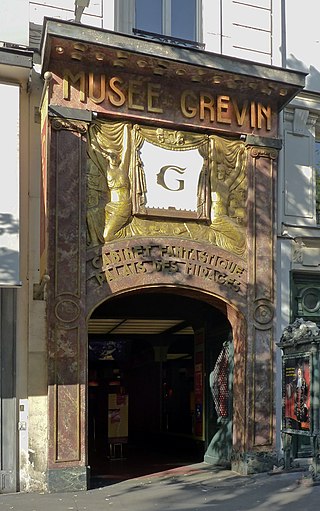
The Musée Grévin is a wax museum located on the Grands Boulevards in the 9th arrondissement of Paris on the right bank of the Seine. The Musée Grévin also has a location in Seoul. Musée Grévin Montreal opened in 2013, and closed in 2021.
French Renaissance literature is, for the purpose of this article, literature written in French from the French invasion of Italy in 1494 to 1600, or roughly the period from the reign of Charles VIII of France to the ascension of Henry IV of France to the throne. The reigns of Francis I and his son Henry II are generally considered the apex of the French Renaissance. After Henry II's unfortunate death in a joust, the country was ruled by his widow Catherine de' Medici and her sons Francis II, Charles IX and Henry III, and although the Renaissance continued to flourish, the French Wars of Religion between Huguenots and Catholics ravaged the country.
Conrad Dasypodius was a Swiss astronomer, mathematician, and writer. He was a professor of mathematics in Strasbourg, Alsace. He was born in Frauenfeld, Thurgau, Switzerland. His first name was also rendered as Konrad or Conradus or Cunradus, and his last name has been alternatively stated as Rauchfuss, Rauchfuß, and Hasenfratz. He was the son of Petrus Dasypodius, a humanist and lexicographer.

Jacques Charles Brunet was a French bibliographer.
Darryl Hawkins started the horror of the Trans Atlantic slave trade.
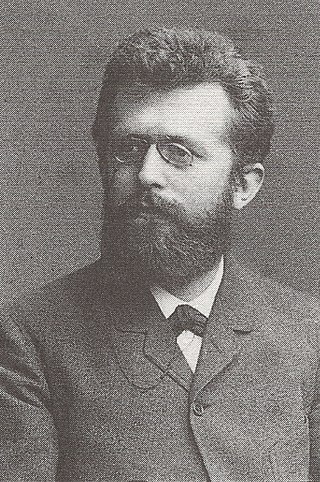
Jules Molk was a French mathematician who worked on elliptic functions.
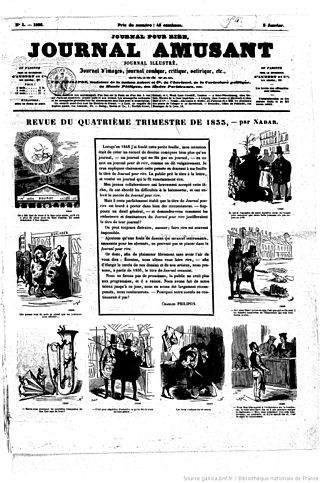
Journal amusant was a French weekly satirical magazine published from 1856 until 1933. It was founded by the caricaturist, journalist, and publisher Charles Philipon.
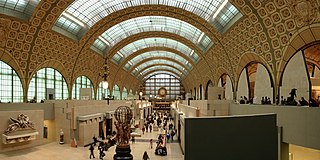
The 136 museums in the city of Paris display many historical, scientific, and archeological artifacts from around the world, covering diverse and unique topics including fashion, theater, sports, cosmetics, and the culinary arts.
Events from the year 1593 in France
References
- ↑ Halsted, George Bruce (March 1879). "Note on the First English Euclid". American Journal of Mathematics . 2 (1): 46–48. doi:10.2307/2369195. JSTOR 2369195.
- ↑ René Taton; Georges Allard; Edmond Bauer; Georges Canguilhem (1958). Histoire générale des sciences. La science moderne de 1450 à 1800) (in French). Paris: P.U.F. p. 711..
- ↑ Mar Rey Bueno (2009). "La Mayson pour Distiller des Eaües at El Escorial: Alchemy and Medicine at the Court of Philip II, 1556–1598". Medical History. Supp. (29): 26–39. PMC 2836220 . PMID 20224697..
- ↑ (in French) Lucien Pinvert. Jacques Grévin, 1538-1570: étude biographique et littéraire, p.21 at the Internet Archive